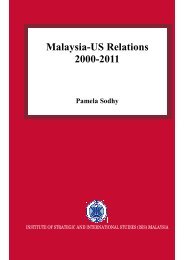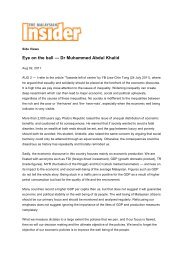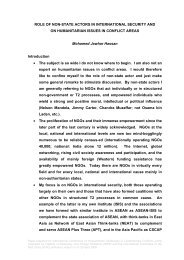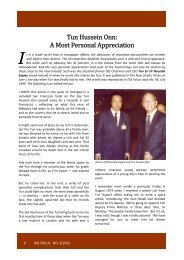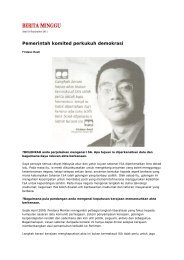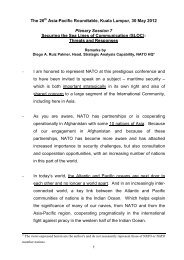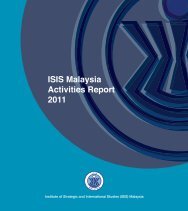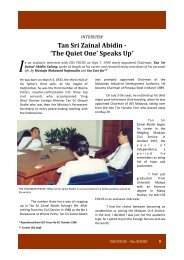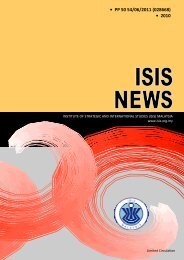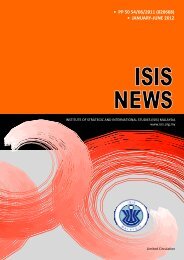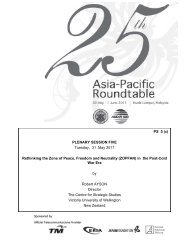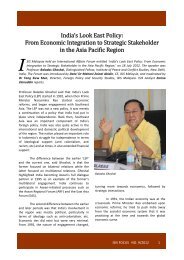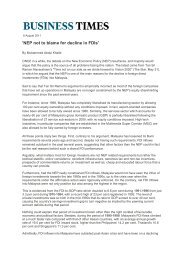Soft Power of Defence Diplomacy: A New Approach ... - ISIS Malaysia
Soft Power of Defence Diplomacy: A New Approach ... - ISIS Malaysia
Soft Power of Defence Diplomacy: A New Approach ... - ISIS Malaysia
You also want an ePaper? Increase the reach of your titles
YUMPU automatically turns print PDFs into web optimized ePapers that Google loves.
3In this circumstance the extent <strong>of</strong> public involvement is generally very high and thetone is hostile. Seeking to create public support for resistance to the perceivedimperial state, the leaders create a strategic culture based on demonizing the externalthreat. Resistance by the rogue to the imperial state is thus seen as the only availableoption. Capitulation is portrayed as tantamount to national suicide given the perceivedthreat posed by the imperial state. It is also politically untenable domestically giventhe embedded strategic culture within the rogue state. This situation leads to acontinuance <strong>of</strong> previous policies, including efforts to acquire more sophisticatedweapons systems and support for those seen as challenging the dominance <strong>of</strong> the greatpower and its allies.Second, why do stronger states desist from removing the rogue? The imperial statefaces a different environment. While the rogue state may pose a danger to valuedinterests, it is not an existential threat and thus is scored as a low threat. Also therelative power capabilities is advantageous. Thus while the great power may have thecapacity to eliminate the rogue, there is no strong motivation for undertaking such aforceful action. Should the rogue, at some time, enhance their capability to a pointwhere the threat perception becomes acute, there should be a strong reaction due tothe altered strategic environment and the subsequent expression <strong>of</strong> public concern.Yet, even at low levels <strong>of</strong> perceived threat, the great power <strong>of</strong>ten maintains amoderately coercive strategy vis-ˆ-vis the rogue states. The critical question here iswhy is Cuba, for example, treated differently (as a rogue requiring sanctions) thanother states in the world which possess similar relative capabilities? This is where therole <strong>of</strong> the attentive public is crucial. Certain sectors <strong>of</strong> the domestic population arehighly engaged regarding policy toward particular states. Their influence isheightened during periods <strong>of</strong> low perceived threat because there are fewer counterinfluences operating. In response to the political power and influence <strong>of</strong> this attentivepublic the government takes a mid-range policy stance, more coercive than in mostlow threat circumstances, but not at a level <strong>of</strong> devoting the political and economiccapital necessary to eliminate the rogue.Finally, why does this relationship persist so long? Rogues maintain their resistanceto the imperial state because their perception <strong>of</strong> high threat from the great power, theyfeel, necessitates resistance. The continued efforts at compellence on the part <strong>of</strong> theimperial state are taken as incontrovertible evidence <strong>of</strong> its unending hostility.Accommodation with such a power is unthinkable. Also, the creation <strong>of</strong> a strategicculture <strong>of</strong> resistance to the imperialist power limits the political options available tothe leadership even if they came to believe accommodation wise. Confrontationbecomes ingrained.From the great power side, the unwillingness <strong>of</strong> the rogue to yield is taken as evidence<strong>of</strong> their unalterable hostility and aggressive intent, feeding the threat perception.Efforts by the rogue to enhance their power capability are also taken as evidence <strong>of</strong>aggressive intent and not as defensive reactionism. However, as long as there is littleexistential threat, there is little governmental or public support for decisive action.The attentive public exerts enough influence to maintain a moderate compellencestance but moves beyond this level are not sanctioned. Thus the actions <strong>of</strong> both partiescreate a cycle <strong>of</strong> mistrust and hostility which both sides, perhaps unwittingly,maintain.



